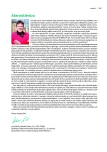-
Medical journals
- Career
Notes on the HOPE-3 study
Authors: Vladimír Soška 1,2
Authors‘ workplace: Oddělení klinické biochemie, ICRC – oddělení kardiovaskulárních chorob FN u sv. Anny v Brně 1; Katedra laboratorních metod LF MU Brno a II. interní klinika LF MU a FN u sv. Anny v Brně 2
Published in: Vnitř Lék 2016; 62(11): 929-932
Category:
Overview
The study HOPE-3 aimed to determine whether treatment with statin and with antihypertensive drugs (candesartan and hydrochlorothiazide) in routine clinical practice in people without cardiovascular diseases (men aged over 55, women over 65 years) will reduce cardiovascular events. Another objective was to answer whether the effect of the above-mentioned treatment will be the same in different ethnic (anthropometric) populations. All drugs were administered as an “polypills”. The study demonstrated that use of antihypertensive medication in this population does not reduce the incidence of cardiovascular events. In contrast, statin treatment reduced cardiovascular events statistically highly significant (p = 0.002). The effect of treatment was the same for all ethnic groups included to the study (total of 6 continents).
Key words:
antihypertenzive drugs – cardiovascular prevention – dyslipidemia – hypertension – statins
Sources
1. Lonn E, Bosch J, Pogue J et al. Novel Approaches in Primary Cardiovascular Disease Prevention: The HOPE-3 Trial Rationale, Design, and Participants’ Baseline Characteristics. Can J Cardiol 2016; 32(3): 311–318. Dostupné z DOI: <http://dx.doi.org/10.1016/j.cjca.2015.07.001>.
2. Catapano AL, Graham I, De Backer G et al. 2016 ESC/EAS Guidelines for the Management of Dyslipidaemias: The Task Force for the Management of Dyslipidaemias of the European Society of Cardiology (ESC) and European Atherosclerosis Society (EAS)Developed with the special contribution of the European Assocciation for Cardiovascular Prevention & Rehabilitation (EACPR). Eur Heart J 2016. pii: ehw272. Dostupné z DOI: <http://dx.doi.org/10.1093/eurheartj/ehw272>.
3. Lonn EM, Bosch J, Lopez-Jaramillo P et al. Blood-Pressure Lowering in Intermediate-Risk Persons without Cardiovascular Disease. N Engl J Med 2016; 374(21): 2009–2020. Dostupné z DOI: <http://dx.doi.org/10.1056/NEJMoa1600175>.
4. Yusuf S, Bosch J, Dagenais G et al. Cholesterol Lowering in Intermediate-Risk Persons without Cardiovascular Disease. N Engl J Med 2016; 374(21): 2021–2031. Dostupné z DOI: <http://dx.doi.org/10.1056/NEJMoa1600176>.
5. Yusuf S, Lonn E, Pais P et al. Blood-Pressure and Cholesterol Lowering in Persons without Cardiovascular Disease. N Engl J Med 2016; 374(21): 2032–2043. Dostupné z DOI: <http://dx.doi.org/10.1056/NEJMoa1600177>.
6. Vaverková H, Soška V, Rosolová H et al. Czech Atherosclerosis Society Guidelines for the diagnosis and treatment of dyslipidemias in adults. Vnitř Lék 2007; 53(2): 181–187.
Labels
Diabetology Endocrinology Internal medicine
Article was published inInternal Medicine

2016 Issue 11-
All articles in this issue
- Hypertension and hypercholesterolemia in the Czech population
- Genetic determination of dyslipidemia – What tell us the results of genome-wide association studies?
- Molecular genetics of hypercholesterolemia
- Hyperlipoproteinemia in children
- Hyperlipoproteinemia and dyslipidemia as rare diseases. Diagnostics and treatment
- Severe familial hypercholesterolemia treatment
- How to deal ugly twins, LDL-cholesterol and lipoprotein (a)
- Diabetes and dyslipidemia: Why are they so closely related?
- A diet suitable for patients with dyslipidemia and metabolic syndrome
- Uric acid as a risk factor for cardiovascular diseases
- Familial hypercholesterolemia in the Czech Republic in 2016
- Notes on the HOPE-3 study
- The SPRINT study – the outcomes of the most important study over the recent period focused on hypertension
- Internal Medicine
- Journal archive
- Current issue
- Online only
- About the journal
Most read in this issue- A diet suitable for patients with dyslipidemia and metabolic syndrome
- Hyperlipoproteinemia in children
- Hyperlipoproteinemia and dyslipidemia as rare diseases. Diagnostics and treatment
- Uric acid as a risk factor for cardiovascular diseases
Login#ADS_BOTTOM_SCRIPTS#Forgotten passwordEnter the email address that you registered with. We will send you instructions on how to set a new password.
- Career

